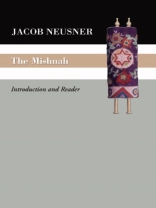A leading scholar of the formative age and writings of Judaism here formulates a theory of the Mishnah (one of the earliest dated sources of Judaism): what it is, how it should be read, and why it is of considerable interest in the study of religious conceptions of the social order. Each of the book’s chapters are amply illustrated with texts that have been freshly translated by the author.
The result is a relatively quick and easy entry into the sometimes difficult and complex world of the Mishnah and its laws concerning agriculture, appointed seasons, women and property, civil and criminal law, conduct of the cult and the Temple, and preservation of cultic purity in the Temple and under certain domestic circumstances, with special reference to the table and the bed.
Any valid description of early rabbinic thought – and therefore of early Christianity – must begin with the Mishnah and must focus on the subjects the sages considered important. This book introduces the reader to the world of the Mishnah in a thoughtful, engaging, and spirited manner.
Giới thiệu về tác giả
Jacob Neusner is Research Professor of Religion and Theology at Bard College and Senior Fellow of the Institute of Advanced Theology at Bard. He has published more than 900 books and unnumbered articles, both scholarly and academic and popular and journalistic, and is the most published humanities scholar in the world. He has been awarded nine honorary degrees, including seven U.S. and European honorary doctorates. He received his AB from Harvard College in 1953, his Ph D from Columbia University and Union Theological Seminary in 1961, and rabbinical ordination and the degree of Master of Hebrew Letters from the Jewish Theological Seminary of America in 1960.Neusner is editor of the Encyclopedia of Judaism (Brill, 1999. I-III) and its Supplements; Chair of the Editorial Board of The Review of Rabbinic Judaism, and Editor in Chief of The Brill Reference Library of Judaism, both published by E. J. Brill, Leiden, The Netherlands. He is editor of Studies in Judaism, University Press of America.Neusner resides with his wife in Rhinebeck, New York. They have a daughter, three sons and three daughters-in-law, six granddaughters and two grandsons.







![Bìa của Brian Schrag & Julisa Rowe: Community Arts for God's Purposes [Chinese] 貼近神心意的社群藝術 Bìa của Brian Schrag & Julisa Rowe: Community Arts for God's Purposes [Chinese] 貼近神心意的社群藝術](https://static.worldofdigitals.com/thumb_webp/740/9781645083740.webp)




